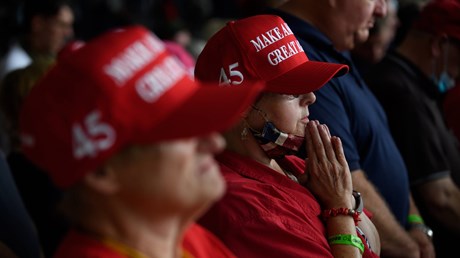Surveys show evangelical identity holding steady in recent years, but with more complicated partisan connotations for the church.

Despite tense polarization, there was no mass exodus from evangelicalism by white evangelicals who disliked Donald Trump nor by evangelicals of color during the four years of his presidency, Pew Research Center found.
According to analysis released Wednesday, more Americans started identifying as born-again or evangelical Protestants between 2016 and 2020 than stopped calling themselves evangelicals. The boost came almost entirely from white Trump supporters.
Among those who didn’t consider themselves evangelicals when the former president was elected, nearly 1 in 6 had begun identifying as evangelicals by 2020. Just 1 percent of white Americans who did not favor Trump made the same switch.
The findings complicate an already fraught discussion around the future of the evangelicalism and the political baggage the label carries in the United States.
“Evangelicalism is not collapsing, despite the enthusiasm predictions of its detractors. However, what it is becoming I think is worthy of more conversation,” said Ed Stetzer, executive director of the Wheaton College Billy Graham Center. “There are significant implications to the fact that significant numbers of white Trump supporters now identify as evangelical or born again. We don’t know why, and correlation does not always mean causation, but there is more to study here.”
In the past two presidential elections, white evangelical Protestants made up a core voting bloc for President Trump, as they did for previous Republican candidates, including Mitt Romney, John McCain, and George W. Bush. But “just 30% of non-White voters who identify as born-again or evangelical Protestants (including just 12% of Black evangelical voters) reported casting …
